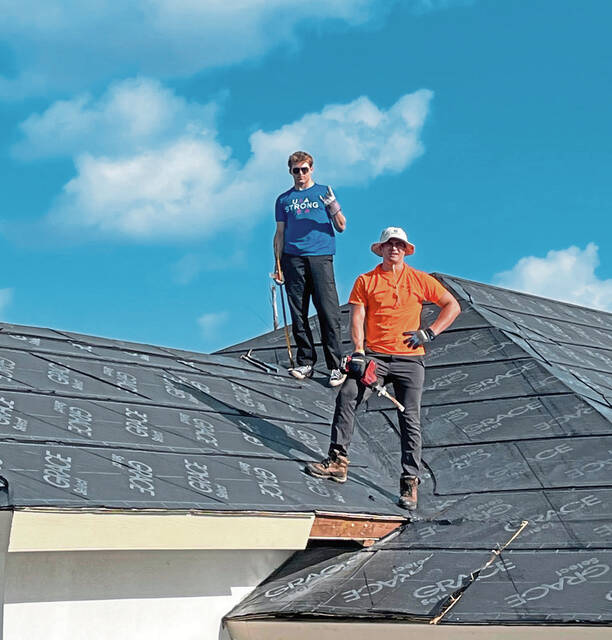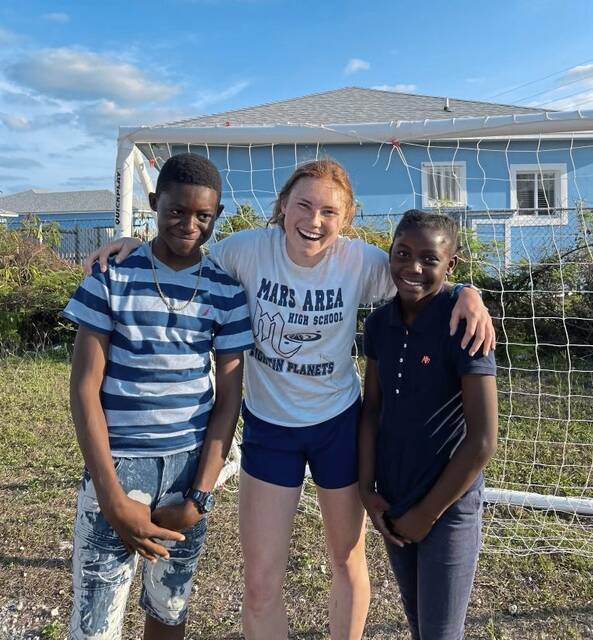Mission trip to Bahamas 'eye-opening' experience for 17 Pitt student-athletes
The daily heat from the sun baking the Abaco Islands was fierce, relentless.
Especially on the roof of the local library, where some of the 17 Pitt student-athletes — men and women from five sports — were nailing down new shingles.
There was stubborn devastation all around them on the islands in the northern Bahamas, remnants of Hurricane Dorian that carried record winds of 185 mph onto the town of Marsh Harbour in 2019. The athletes’ mission was to do whatever possible to quicken the slow recovery.
Pitt soccer player Ashton Gordon admitted the shingles were heavy, and the possibility of falling from the roof was in the back of her mind.
But none of that mattered as much as the desire to help people in need.
“It was fun,” said Gordon, a senior from Tulsa, Okla. “I just enjoy working hard and knowing that we were helping the community and the people there. To see how thankful people were for it was really wonderful, too.”
After a three-year hiatus created by the covid-19 pandemic, Pitt campus ministers Mark Steffey and Kelly Cooke, who work for the Coalition of Christian Outreach, led their ninth mission trip in 12 years early last month.
They accompanied Pitt student-athletes on six trips to Haiti — former football player Mike Caprara led another in 2016 — but when the U.S. State Department warned of the Haitian government’s instability, they branched out to the U.S. Virgin Islands, Dominican Republic and Bahamas.
At one time or another, 160 student-athletes have joined them.
The school year is long and demanding for students who juggle academics and athletics. If only briefly, spring brings a chance to reconnect with family, relax and recharge for the next challenge.
Still, Cooke said her group was happy to make the sacrifice and postpone their trips home.
“I’ve always wanted to do this,” said sophomore football player Jake Frantl of Erin, Wisc. “It timed up perfectly. Even though it meant missing some family time at home, I knew this was for the greater good, and it really filled my heart with joy.”
Added teammate Ryland Gandy of Buford, Ga., “After spring ball, you want to chill and go home. I just felt like this was a good opportunity to give back to others and do the work of God and make someone else’s life better.”
Recruiting workers for the weeklong trip was easy, Cooke said.
Each Tuesday night throughout the year, Cooke and Steffey lead between 50 and 75 Pitt athletes in a group meeting known as Panther Fellowship. Word of the trip spread, and soon all spots were filled.
“It’s a great opportunity to get students away from who they are as an athlete,” Cooke said. “That’s kind of like their status and how they are seen and oftentimes how they carry themselves. When we go on trips like this, they are not that athlete anymore. They are just Ashton and Jake.
“We believe experiences like this are very catalytic in their character development, faith development, personal development.”
The group banded together to raise $42,000, more than enough to cover airfare, food, ground transportation, supplies and accommodations. Steffey said the remainder will go toward the ministry of Barrett and Carrie Hendrickson, Penn Hills natives who moved to Abaco Island in 2019 to revitalize a church.
“It’s more effective to send $42,000 than to go,” Cooke admitted. “But the experience for the students and even for the mission partners we were there with and the Bahamian people, it’s worth it to spend the money.”
Said Frantl: “The biggest takeaway was everyone had a smile on their face. Some of the mornings were early and you were tired, (but) as soon as you saw those kids smile, you just lit up with joy. You’d never think they were in a bad situation.”
Junior soccer player Ellie Coffield, a Mars graduate, was amazed at the resiliency of the Bahamian people, some of whom live in small houses shared by several family members, sometimes without running water or electricity.
“One of the main things I took away,” she said, “was all of the positivity and hope that can stay in a place despite facing absolute destruction. It was very eye-opening seeing one part of the Bahamas, the commercial part that you think about, and you drive a mile down the street and there are still cars flipped over, houses without roofs.”
Sophomore wrestler A.J. Crews viewed the trip from a unique perspective. The son of diplomats who worked for the U.S. State Department, Crews has visited 68 countries and lived in 10, mostly in Africa.
He said the trip “opened my eyes” to the plight of other less fortunate people around the world.
“This island is so beautiful on its own,” he said, “and you see the poverty and the damage that was caused by a storm that happened almost four years ago, and there are still remnants of damage.
“We’re so lucky in the U.S. to have the resources that we have, compared to other countries who are literally living on nothing. It was really a humbling experience. It helped me be more grateful for what I do have.
“They didn’t have running water, electricity, but you could tell that their spirit was still optimistic. They were so grateful to be alive.”
Crews said he was not on the roof crew, but he, Gandy and football player Rashad Battle spent much of the week painting the inside of a family’s house.
“I never painted before, but it was a pretty cool experience,” Gandy said. “Paint all over me.”
When Crews wasn’t painting, he said he helped clean underneath a stage inside a school where he encountered cockroaches and rats.
“It was hard labor,” said football player Jake Renda of Princeton, N.J., “hot out, sunburn. It was worth it.”
Part of the week was spent involved in sports with local children and teenagers, some of whom were running in bare feet.
There also was a flag football game with adults. If an effort to make flag football an Olympic sport by 2028 is successful, the Bahamas is hoping to field a team.
At various times throughout the week, the group delivered meals to families, some living in a Haitian shanty town. Several of the athletes spoke to youth groups at night.
Then, back in their living quarters where they slept — five or six to a room — on air mattresses, they spoke to each other. Many were strangers before making the trip.
“Every night, we would get together,” Frantl said, “and four people would share, basically, their life story. It was really neat to learn about how everyone comes from different backgrounds and different upbringings. To be able to understand how people act and why people think a certain way, I thought that was really cool.
“When the week was done, I really felt connected to all of them.”
The friendships did not end on Abaco Island.
“I’ll be buds with these guys far along after I graduate,” Coffield said.
Jerry DiPaola is a TribLive reporter covering Pitt athletics since 2011. A Pittsburgh native, he joined the Trib in 1993, first as a copy editor and page designer in the sports department and later as the Pittsburgh Steelers reporter from 1994-2004. He can be reached at jdipaola@triblive.com.
Remove the ads from your TribLIVE reading experience but still support the journalists who create the content with TribLIVE Ad-Free.


